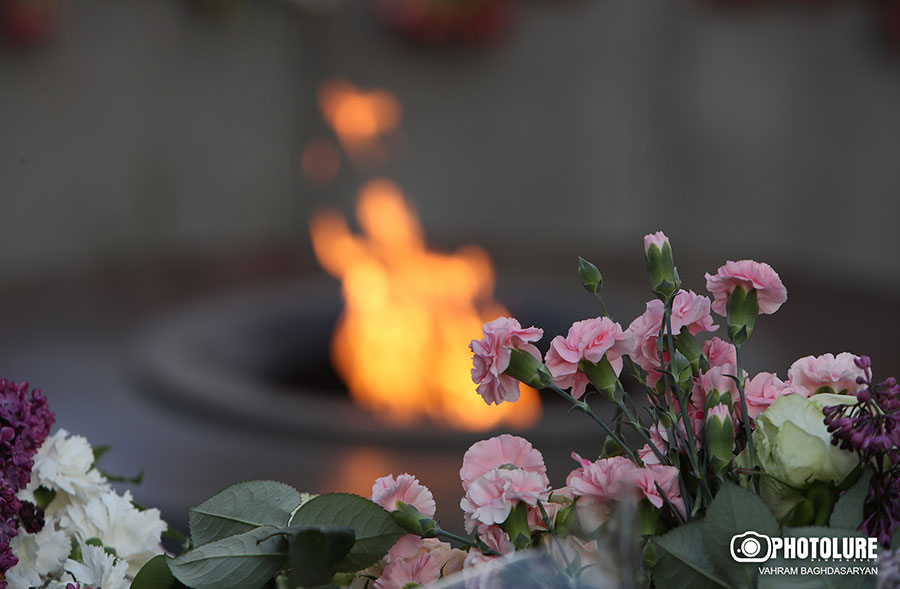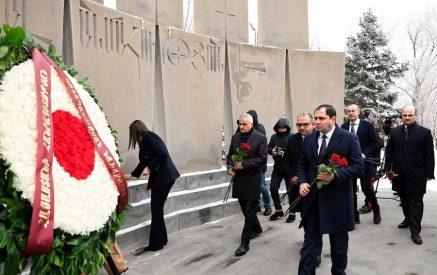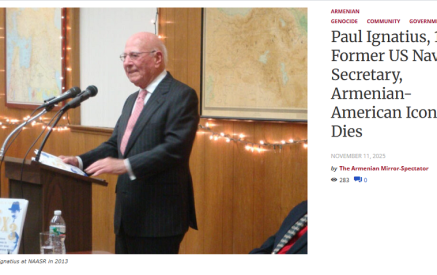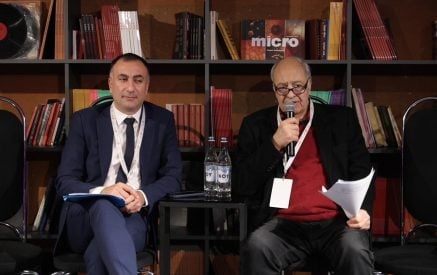Zoryan Institute of Armenia (Yerevan): April being a month dedicated to genocide awareness, is a critical time to emphasize the relevance of genocide education and the critical need to combat prejudice and violence in today’s world.
Today, a question was raised in the Turkish Media:
“……..Question: Armenian Prime Minister Nikol Pashinyan recently refrained from using the term “genocide” when talking about the events of 1915. He just said “big disaster”. This was interpreted as a reflection of the voters who brought him to power, a demand for normalization in the region. The same Pashinyan also criticized Mount Ararat’s inclusion in the state coat of arms, saying that it was within the borders of Türkiye. What do you think about this attitude that seems to be in favour of peace?…..”
Read also
The Zoryan Institute would like to take a moment to reply to that question.
On March 7, 2000, a statement by 126 Holocaust Scholars, Holders of Academic Chairs, and Directors of Holocaust Research and Studies Centers was made and their petition appeared in the New York Times, on June 9, 2000.
“126 HOLOCAUST SCHOLARS AFFIRM THE INCONTESTABLE FACT OF THE ARMENIAN GENOCIDE AND URGE WESTERN DEMOCRACIES TO OFFICIALLY RECOGNIZE IT.
At the Thirtieth Anniversary of the Scholar’s Conference on the Holocaust and the Churches Convening at St. Joseph University, Philadelphia, Pennsylvania, March 3-7, 2000, one hundred twenty-six Holocaust Scholars, holders of Academic Chairs and Directors of Holocaust Research and Studies Centers, participants of the Conference, signed a statement affirming that the World War I Armenian Genocide is an incontestable historical fact and accordingly urge the governments of Western democracies to likewise recognize it as such.
The petitioners, among whom is Nobel Laureate for Peace Elie Wiesel, who was the keynote speaker at the conference, also asked the Western Democracies to urge the Government and Parliament of Turkey to finally come to terms with a dark chapter of Ottoman-Turkish history and to recognize the Armenian Genocide. This would provide an invaluable impetus to the process of the democratization of Turkey.”
With the current state of crisis around the globe, including in Ukraine, Israel-Gaza, and Artsakh (Nagorno-Karabakh) among others, in mind, Dr. Jennifer Rich, Zoryan Academic Board member and editor of the academic journal, Genocide Studies International, reflects on the latest issue, 15.2 and the overlapping experiences that people share.
“[At the time of this publication], the intractable conflict between Israel and Hamas is playing out in real-time on my television, ethnic Armenians continue their forced displacement from Artsakh, and the war in Ukraine rages on. To begin to make sense of the violence, it is imperative to draw connections between now and then, present and past. Genocide scholars—as well as activists, policymakers, and politicians—need to think outside the disciplinary boxes we so often inhabit. We tend to think about the field of Genocide Studies as one rooted in the past, as a field dominated by historians. This general issue of Genocide Studies International, however, shines a bright light on the path, sometimes hidden or overlooked, that connects events across vast spans of time.
The articles by Edita Gzoyan and Stephan Astourian, both about the Armenian Genocide, illustrate the long afterlife of violence as a force that shapes the present. Gzoyan’s article highlights the long-overdue need to move from a culture of impunity to one of accountability. After articulating the process through which the concept of crimes against humanity was developed in the wake of the Armenian Genocide, she exposes the unacceptable truth that there were no legal, or other, consequences for perpetrators of the atrocities. Astourian, in a historiographic appraisal of Armenian Genocide studies, clearly demonstrates that additional research in the field will help fight against the culture of impunity and finally hold the guilty to account. He argues that “we have not yet thoroughly exploited many relevant archival fonds, and efforts should be made in this regard,” and that until this happens, we are unable to accurately determine whether the intent to “exterminate the Armenians already existed before World War I.”
The articles written by Lauren Grant and Christopher Harrison each spotlight current atrocities that have long and violent pasts. Grant’s fieldwork in Canada and Guatemala informs her contribution, which argues that “femicidal and sexual gender-based violence faced by Indigenous women … is a cause and consequence of these states’ failures to effectively guarantee Indigenous women’s intersecting socioeconomic rights, namely their right to adequate housing.” She exposes the intertwined economic and political interests of these two nation-states that have led to a system of “legal violence,” as well as the complicity of international human rights organizations in allowing the rights of Indigenous women to remain violated.
Harrison’s timely article uses the recent atrocities committed by the Wagner Group in Bucha, Ukraine to argue that “the expendability of penal battalions has provided genocidal regimes with ample fodder for conventional wars, genocidal warfare, and cases in which such conscripts may become either perpetrators or victims.” His article traces the history of penal battalions, demonstrates “the evolution of Wagner as a significant force in global politics and conflict,” and—ultimately—suggests that “prosecution, prevention, or intervention will become even more difficult than it already is for institutions of international law.
Tomorrow, April 24th, is the day that the entire world, Armenians, and those who stand for humanity, reflect on the memories of those who perished in the 1915 Armenian Genocide.
We urge the Armenian government to remember the “Convention on the Prevention and Punishment of the Crime of Genocide.”
In the present Convention, genocide means any of the following acts committed with intent to destroy, in whole or in part, a national, ethnical, racial or religious group, as such:
(a) Killing members of the group;
(b) Causing serious bodily or mental harm to members of the group;
(c) Deliberately inflicting on the group conditions of life calculated to bring about its physical destruction in whole or in part;
(d) Imposing measures intended to prevent births within the group;
(e) Forcibly transferring children of the group to another group.
Clause number two of the convection above emphasizes the intent to destroy in part. Numbers killed, do not make a mass atrocity into a genocide




























































